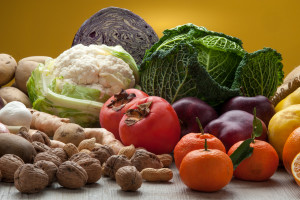What is a Vegan meal plan?
 Veganism and the Vegan meal plan have become some of the most successful lifestyle choices people can make these days. More and more people seem to understand the benefits of the vegan way of life, which is more than a diet, but rather a life philosophy. As opposed to vegetarians, who might consume eggs (ovo-vegetarians) or dairy (lacto-vegetarian), vegans do not eat anything that is of animal origin, nor use animal based products for clothing or any other purpose. Hence, an entire philosophy that redefines your way of eating and living.
Veganism and the Vegan meal plan have become some of the most successful lifestyle choices people can make these days. More and more people seem to understand the benefits of the vegan way of life, which is more than a diet, but rather a life philosophy. As opposed to vegetarians, who might consume eggs (ovo-vegetarians) or dairy (lacto-vegetarian), vegans do not eat anything that is of animal origin, nor use animal based products for clothing or any other purpose. Hence, an entire philosophy that redefines your way of eating and living.
As far as a healthy vegan diet plan is concerned, it must be well balanced in order to assure all the nutrients human body needs, like proteins and calcium and other nutrients. If you have decided to switch from an omnivore diet to a vegan one, here are the most important vegan foods you need to include in your daily vegan meal plan in order to keep you safe from nutrition and health problems. It is very easy when first starting out on a vegan diet to fall for the trap of buying the processed vegan meat substitutes available on the market today…hmm not so good for you!
Vegan foods – what are the most important for your vegan meal plan?
Nuts and seeds
Hazelnuts, cashew, almonds, Brazil or Macadamia nuts all contain high amounts of fats, fiber, and fat-soluble vitamins. They are an important part of any vegan meal plan. But in order to enjoy all their nutritional benefits, nuts must be consumed raw. Roasting them not only destroys the nutrients, but also produces toxic compounds you should not be eating.
You should also include lots of seeds in your vegan meal plan. Hemp, chia, pumpkin and poppy seeds are rich in healthy fats, especially vegetable Omega 3, proteins and fiber. However, you must maintain the right balance between omega 3 and omega 6 fats.
There is now scientific evidence that a food intake with a distorted omega 6:omega 3 ratio (in favor of the omega 6) increases the risk for many diseases, including Alzheimer’s and diabetes. The ratio should be 1:1, so don’t overdo eating nuts and seeds high in omega 6, such as sunflower, corn, sesame and flaxseeds, peanuts, soybeans, and walnuts.
Fruits
Fruits contain high amounts of vitamins, minerals, phytonutrients and water, but are low in calories and fats. Berries, watermelons, citrus and tropical fruits, apples, pears, plums, apricots, mushrooms (yes, they are fruits!) – are all good for your vegan diet and you should have at least 3 servings a day. Make sure to include one serving of fruits high in vitamin C (citrus fruits, strawberries, melons). Also, consume more raw fruits than fruit juices, which don’t contain much fiber.
Vegetables
Vegetables are packed with vitamins, minerals, and other nutrients. Dark green leafy vegetables, such as broccoli, collards, cabbage, kale or turnip greens, are good sources of vitamin C, beta-carotene, iron, calcium, fiber, and protein. Dark yellow and orange vegetables (carrots, winter squash, sweet potatoes, pumpkin) provide extra beta-carotene. It’s recommended you include 4 or more servings of vegetables in your daily vegan meal plan.
Legumes
“Legumes” is another term for beans, peas, and lentils. These are all nutritional powerhouses and great additions to meals, excellent sources of fiber, protein, iron, calcium, zinc, B vitamins and a bunch of other nutrients that can prevent cancer and heart disease. This food category also includes chickpeas, soy milk, tempeh and soy meat. You should eat at least 2 servings of legumes every day.
Whole grains
Whole grains will ensure your daily intake of fiber, proteins, antioxidants, vitamins (vitamin B6, vitamin E) and dietary minerals (magnesium, manganese, phosphorus, selenium). They are nutritionally superior to refined grains and help keep you protected from diabetes, hypertension, heart disease, stomach, and colon cancer. It is recommended to eat 5 or more servings a day of whole grains such as oats, quinoa, brown rice, barley, buckwheat, spelt, and wheat, but avoid refined grains such as white flour or white rice, as they are lacking nutrients and can make you gain weight easily.
Famous vegans
As we become more and more conscious about our own health and environmental well-being, many of us turn to veganism as a healthy way of life. It can improve our diet and lifestyle. Celebrities even do it! There are many actors, singers and TV personalities who are animal rights activists and promoters for the vegan way of life. These big names will surely ring a bell:
Gwyneth Paltrow – this Hollywood actress is one of the most avid advocates for a vegan meal plan lifestyle. She confessed switching to veganism changed her life and cured her of the various health problems she experienced. Gwyneth Paltrow also has a lifestyle blog that promotes vegan healthy living.
Ellen DeGeneres – the successful television host is one of the biggest vegan and animal rights activist in Hollywood. She coordinates “Going Vegan with Ellen”, a vegan outreach website where she promotes “Meatless Mondays” and various vegan recipes.
Brad Pitt – the handsome actor is another ardent animal rights activist. He argues that the damage caused by methane gasses produced from cattle should be a reason enough to go vegan.
Woody Harrison – a “veteran vegan”, the Hollywood actor never eats meat, dairy, sugar or flour. When he played a character with an affinity for Twinkies in the movie “Zombieland” (2009), he replaced them with faux-Twinkies made of cornmeal.
Joaquin Phoenix – the Oscar-nominated actor appeared in numerous ads for PETA and always insists on wearing faux leather for his movie roles. For example, when interpreting the role of Commodus in “Gladiator” (2000), he wore vegan sandals.
These famous vegans are committed to following the vegan lifestyle and are having far-reaching influence as a result. Consider choosing veganism as a way to become healthier and more conscious and responsible for the world you live in. By following these simple steps, you can see a Vegan Meal Plan is pretty easy to follow. Have fun!

